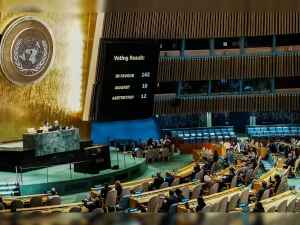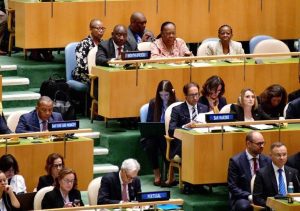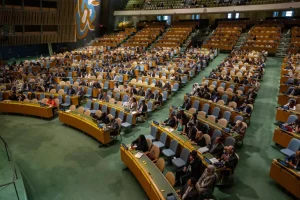The United Nations General Assembly witnessed a significant diplomatic moment on Friday as 142 nations, including India, voted in favour of a resolution endorsing the peaceful settlement of the Palestinian question through the two-state solution. This overwhelming support for the India UNGA Palestine two-state solution initiative represents one of the most decisive international responses to the ongoing Israeli-Palestinian conflict in recent years.
 Also Read: India UNGA Palestine two-state solution
Also Read: India UNGA Palestine two-state solution
Other: UNHRC Minority Debate
The resolution, formally titled “Endorsement of the New York Declaration on the Peaceful Settlement of the Question of Palestine and the Implementation of the Two-State Solution,” was introduced by France and received remarkable international backing with only 10 nations voting against and 12 abstaining.
India’s support for the India UNGA Palestine two-state solution reflects the nation’s longstanding commitment to international peace and diplomatic resolution of conflicts. This vote aligns with India’s historical position of supporting Palestinian self-determination while maintaining balanced relations in the Middle East region.
The Indian delegation’s decision to back this resolution demonstrates New Delhi’s continued advocacy for multilateral approaches to complex geopolitical challenges. By supporting the India UNGA Palestine two-state solution, India reinforced its commitment to United Nations principles and international law.
The foundation of this resolution stems from the New York Declaration, which emerged from a high-level conference held in July, co-chaired by France and Saudi Arabia. This declaration established a comprehensive framework for addressing the Israeli-Palestinian conflict through structured international cooperation.
The declaration specifically calls for collective action to end the ongoing war in Gaza while establishing mechanisms for sustainable peace. The India UNGA Palestine two-state solution endorsement through this resolution provides international legitimacy to these peace-building efforts.
Key provisions of the New York Declaration include immediate cessation of hostilities, recognition of Palestinian rights to self-determination, and establishment of clear boundaries for both Israeli and Palestinian territories. The framework emphasises that any sustainable solution must address the root causes of the conflict while ensuring security for all parties involved.
Among the nations that voted against the resolution were Israel, the United States, Argentina, and Hungary, highlighting the continued divisions in international approaches to the Israeli-Palestinian conflict. Despite this opposition, the overwhelming majority’s support for the India UNGA Palestine two-state solution demonstrates a broad international consensus.


The resolution specifically addresses Gaza’s status, asserting that “Gaza is an integral part of a Palestinian State and must be unified with the West Bank.” This provision addresses one of the most complex aspects of any future two-state arrangement.
The India UNGA Palestine two-state solution framework explicitly prohibits territorial reduction, forced displacement, or continued occupation of Palestinian territories. These provisions aim to create conditions for viable Palestinian statehood while addressing Israeli security concerns through international guarantees.
The resolution places specific demands on Israeli leadership, calling for public commitment to the two-state framework and immediate cessation of settlement activities. The India UNGA Palestine two-state solution endorsement includes requirements for Israel to halt land grabs, annexation activities, and settler violence in the occupied Palestinian territories, including East Jerusalem.
The resolution also condemns both the Hamas attack on southern Israel on October 7 and Israel’s siege and starvation tactics in Gaza, which have produced a humanitarian catastrophe. This balanced approach addresses violations and suffering on both sides of the conflict.
The declaration emphasises that the persistence of the Middle East conflict poses grave implications for regional and international peace and security. The India UNGA Palestine two-state solution reflects an understanding that this conflict’s resolution is crucial for broader Middle Eastern stability.
Without decisive measures toward implementing the two-state solution and robust international guarantees, the declaration warns that the conflict will deepen and regional peace will remain elusive. This assessment underscores the urgency of international action beyond symbolic resolutions.
While the India UNGA Palestine two-state solution receives broad international support, implementation faces significant practical challenges. The resolution calls for an immediate end to the Gaza war and the establishment of mechanisms for sustainable peace, but translating these aspirations into concrete actions requires sustained diplomatic engagement.


The resolution addresses urgent humanitarian concerns, particularly the catastrophic situation in Gaza. The India UNGA Palestine two-state solution framework emphasises ending the siege and ensuring humanitarian access to affected populations.
International humanitarian law compliance becomes central to any peace process, with the resolution calling for the protection of civilian populations and respect for human rights in all territories affected by the conflict.
The India UNGA Palestine two-state solution endorsement represents a significant diplomatic milestone, but sustainable peace requires translating international support into concrete action. The overwhelming vote demonstrates global recognition that the two-state solution remains the most viable path to ending the Israeli-Palestinian conflict.
The success of the India UNGA Palestine two-state solution ultimately depends on political will from all stakeholders, continued international engagement, and commitment to addressing both peoples’ legitimate aspirations for security, dignity, and self-determination. The resolution provides a foundation, but building lasting peace requires sustained effort beyond the UN General Assembly halls.

